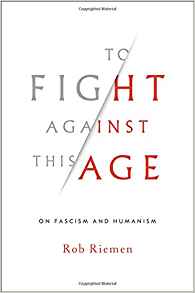 Rob Riemen, To Fight Against This Age; On Fascism and Humanism (New York: W.W. Norton, 2018), 171pp.
Rob Riemen, To Fight Against This Age; On Fascism and Humanism (New York: W.W. Norton, 2018), 171pp.
This fiery manifesto by the Dutch cultural philosopher Rob Riemen consists of two essays that he wrote in his home country of the Netherlands. The first one, published in 2010, is called "The Eternal Return of Fascism." Written as a response to the far right movement in Holland led by Geert Wilders and the Freedom Party, it became a best seller there, even as it was ferociously criticized by the political class and intellectual elites for "panic-mongering." To Riemen, "it was obvious that a fascist movement was on the rise again." And if a fascist movement could emerge in a bastion of liberal democracy like the Netherlands, says Riemen, it could happen anywhere.
Although he opens himself to criticisms for using such a provocative word with specific historical antecedents in Hitler and Mussolini, Riemen argues that the word "populism" is far too inadequate to describe what we're witnessing in Europe and the United States — the exploitation of resentments, blindly following charismatic leaders, hatred, xenophobia, declarations of freedom, "the false promise of the return to an unattainable past," "the high art of lying," and the denial of obvious truths. These fascist trends repudiate "the values and ideals of liberal democracy and European humanism, traditions in which the spiritual and moral development of the free individual form the basis of a free and open society."
The second chapter is a 2015 essay called "The Return of Europa: Her Tears, Deeds, and Dreams." In it, Riemen describes his visits to two different hotels in Europe. One of them symbolizes a nostalgia for a political past that is never to return, and the other the possibilities for "what's left for the West" (the theme of a conference he attended at the hotel). The "heart of democracy," says Riemen, is education. And by education he means a return to spiritual and universal values, indeed, the care for and cultivation of the soul in virtues like justice, truth and beauty. These are found in our poetry, literature, art, music, and our Judeo-Christian heritage that our technologically-obsessed age ignores.
Will we learn the lessons of Europe's descent into fascism? Riemen quotes the Italian Jew and Holocaust survivor Primo Levi (1919–1987): "It took place in the teeth of all forecasts; it happened in Europe; incredibly, it happened that an entire civilized people, just issued from the fervid cultural flowering of Weimar, followed a buffoon whose figure today inspires laughter, and yet Adolf Hitler was obeyed and his praises were sung right up to the catastrophe. It happened, therefore it can happen again: this is the core of what we have to say."


